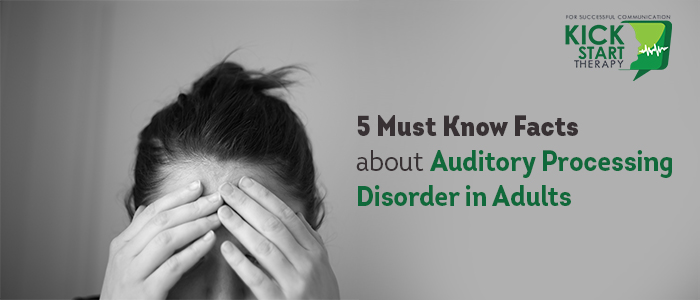
Auditory Processing Disorder (APD), often referred to as Central Auditory Processing Disorder (CAPD), is a condition affecting an individual's brain’s ability to filter and interpret sounds. People with APD possess normal hearing abilities; however, their brains have difficulty receiving, organizing, and making sense of sound.
A significant sign of Auditory Processing Disorder in adults is having difficulty listening when there is background noise or in reverberant environments. Adults with APD can also have other signs and symptoms, including:
Doctors are not aware of the causes of the condition. However, they associate the disorder with other conditions, such as multiple sclerosis and conditions that affects attention, learning, and language, such as ADHD and dyslexia. Other possible causes include the following:
A management myth stated that since there is no cure for auditory processing disorder in adults, there is no value in assessing skills. However, assessments might provide a guide for proper interventions and treatment. Instead of curing APD, experts develop approaches to improve ability and communication skills.
When medical practitioners see APD as a spectrum disorder, they might use bottom-up and top-down interventions. Bottom-up treatments refer to environmental modification and auditory training that improves acoustics and the listening environment. On the other hand, the top-down treatments focus on higher-level functions, including cognition, language and memory. It uses language, cognitive and instructional modification strategies.
Even adults experience hearing difficulties in noisy environments. Experts relate APD as a cause of listening difficulties other than structural hearing loss among older adults. These individuals have speech perception problems, such as speech-in-noise and speech audibility. Central auditory processing abnormality increase with age.
Dyslexic adults also exhibit difficulty processing fast sound sequences, indicating an auditory processing deficit. Adults with dyslexia have problems processing rapid sound sequences. The significant delay in conscious auditory perception will continue throughout their lifetime.
Often people slip down on wet floors or stumble down the stairs. These accidents cause severe head injury or brain trauma, and an estimated 50% of people experiencing a brain injury experience APD. There are situations when people experiencing a minor head injury have difficulty understanding spoken words and recalling information.
At Kick Start Therapy, we have trained, experienced and certified speech-language pathologists who assist people with APD. We conduct required tests and assist the patients according to the analysis. We offer individualized therapy services through our multidisciplinary team of registered and certified behavioural consultants, ABA therapists, occupational therapists and other rehabilitation therapists.






